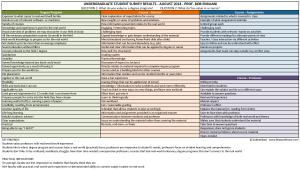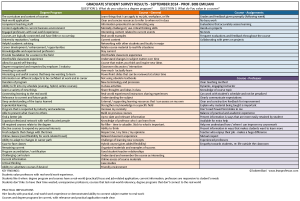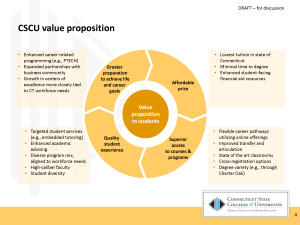At the start of this semester (Fall 2014), I asked my students (n = 97) in my courses (one undergraduate and 3 graduate) the following questions:
- What do you value in a degree program?
- What do you value in a course?
These are students in a school of engineering, science, and technology studying various technical and technology management disciplines (though I think the results are likely to be representative of students in other schools as well). Here are the key findings and practical implications for administrators and faculty (click on images to view details).
KEY FINDINGS FROM UNDERGRADUATE STUDENT SURVEY:
 Students value professors with real-world work experience.
Students value professors with real-world work experience.- Students like it when: Degree program and courses have a real-world (practical) focus; professors are responsive to student’s needs; professors focus on student learning and comprehension.
- Students don’t like: To be confused; needlessly struggle; have their time wasted; unresponsive professors; courses that lack real-world relevancy; degree programs that don’t connect to the real world.
PRACTICAL IMPLICATIONS:
- On average, faculty are less responsive to students than faculty think they are.
- Hire faculty with practical, real-world work experience or demonstrated ability to connect subject matter to real-world.
Compare this what graduate students had to say…
KEY FINDINGS FROM GRADUATE STUDENT SURVEY:
 Students value professors with real-world work experience.
Students value professors with real-world work experience.- Students like it when: Degree program and courses have a real-world (practical) focus and job-related application; current information, professors are responsive to student’s needs.
- Students don’t like: To have their time wasted; unresponsive professors; courses that lack real-world relevancy; degree programs that don’t connect to the real world.
PRACTICAL IMPLICATIONS:
- Hire faculty with practical, real-world work experience or demonstrated ability to connect subject matter to real-world.
- Courses and degree programs be current, with relevance and practical application made clear.
The findings are very closely aligned. The thing that stands out the most is how university hiring processes favor candidates with deep theoretical knowledge, which is misaligned with the background and capabilities that students want – and likely payers, parents/spouses, and employers want as well. This great mismatch imperils student success.
University hiring processes should be revised to give preference to academically qualified candidates with both theoretical knowledge and deep practical knowledge. Not only would this better satisfy student’s needs, it can become a great source of competitive advantage to the school (and likely the institution overall), resulting in increased enrollment and improved retention and graduation rates.
Put another way, failure to seek academically qualified candidates with both theoretical knowledge and deep practical knowledge could cause significant budget and prestige problems for academic programs and the school, as well as the institution.
I do not view these results as a reflection of the times we live in. Almost anyone with a undergraduate or graduate degree, age 21 or age 100, will tell you that their best professors were those who had years of professional work experience in the field and therefore deep practical knowledge. Not surprisingly, the pay offered to such candidates should be higher since they possess greater skills and capabilities compared to candidates with only theoretical knowledge. I think it would be wise for universities to return to their roots, where qualified faculty were understood to be those who possessed both theoretical knowledge and deep practical knowledge.
Finally, contrast my results of students’ view of the value of degree programs and courses with what university leadership, along with their consultant (Boston Consulting Group), thinks the value proposition of higher education is (click here for source):
Notice any difference? The gap between how leaders view the value proposition and how students view the value proposition is large. And, this large gap is likely to remain large well into the future, which spells trouble.

